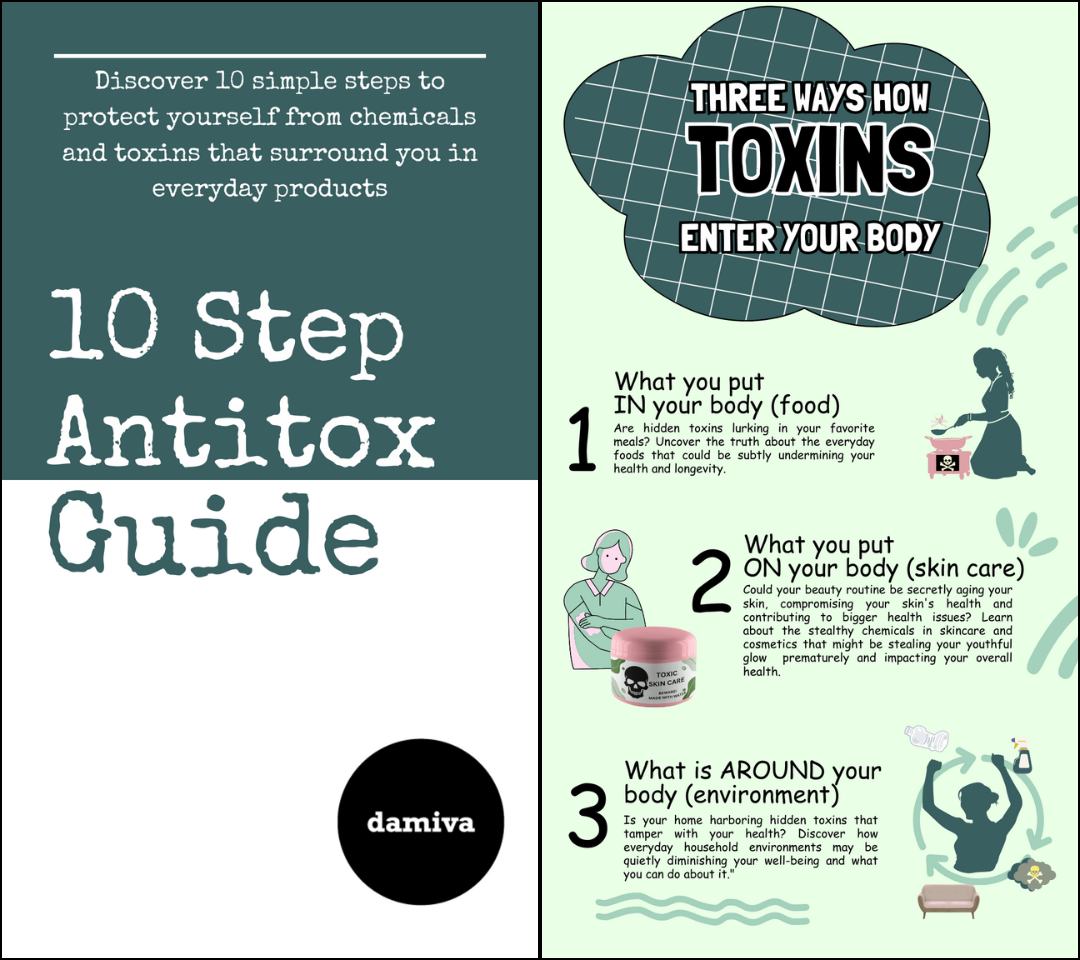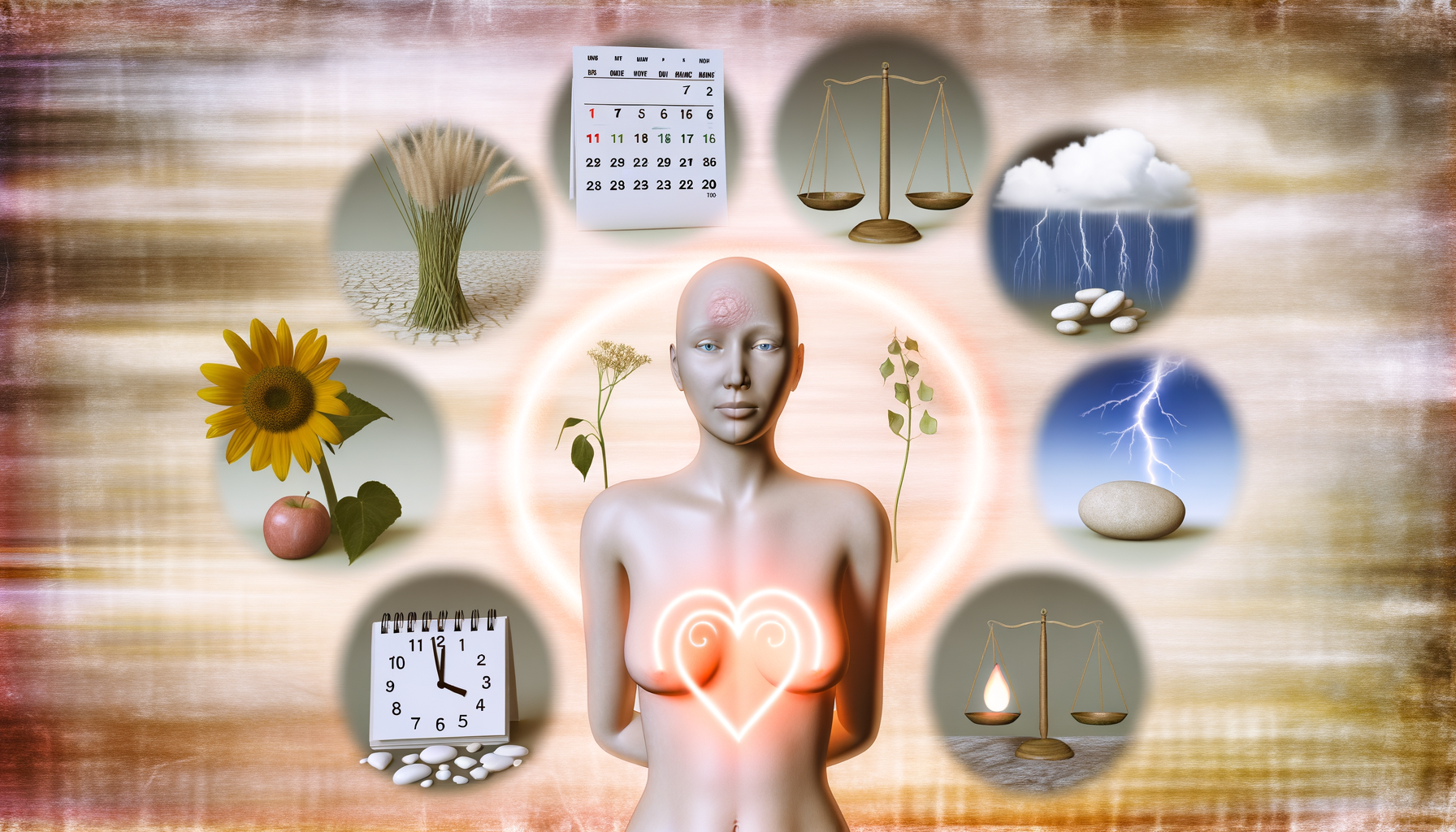Understanding Hormones and Their Functions
Hormones are the body’s chemical messengers, produced in the endocrine glands and released into the bloodstream. They orchestrate many of the body’s functions, including growth, metabolism, reproduction, and mood regulation. Estrogen and progesterone regulate the reproductive system, testosterone influences muscle mass and libido, while thyroid hormones manage metabolism. The delicate balance of these hormones is crucial for optimal health.
Common Causes of Hormonal Imbalance
Hormonal imbalances can arise from a variety of sources. Natural life transitions such as puberty, pregnancy, and menopause are common causes. Lifestyle factors like stress, diet, and exercise also play a role. Chemicals in skin care and the daily products we use are hormone disruptors and affect our hormone systems. Medical conditions, including polycystic ovary syndrome (PCOS), thyroid disorders, and adrenal dysfunction, can disrupt hormone levels. Additionally, medications such as hormonal treatments for menopause or breast cancer, and long-term use of steroids, can lead to imbalances.

Popular Read: Endocrine Disruptors in Skincare: What You Need to Know
Overview of Hormonal Imbalance Symptoms
The symptoms of hormonal imbalance are diverse and can affect multiple systems in the body. Menstrual irregularities such as heavy, irregular, or absent periods may occur, while skin issues can range from acne to dryness and elasticity changes. Digestive problems like irritable bowel syndrome (IBS) may be linked to hormonal fluctuations, and mood disturbances such as anxiety and depression can also be symptomatic of hormonal shifts. Weight changes, particularly unexplained weight gain or loss, are another key indicator. It’s important to recognize these symptoms and consult a healthcare provider for a proper diagnosis and treatment plan.
Menstrual Symptoms of Hormonal Imbalance
Irregular Menstrual Cycles
One of the most evident signs of hormonal imbalance is an irregular menstrual cycle. Normal cycles range from 21 to 35 days, but when hormones such as estrogen and progesterone are out of balance, the cycle can become unpredictable. This irregularity can manifest as missed periods, continuous spotting, or cycles that are shorter or longer than usual. It’s important to note that occasional variations in the menstrual cycle are common and not necessarily a cause for concern. However, consistently irregular cycles may warrant a medical evaluation to determine the underlying cause.
Menstrual Discomfort and Disorders
Many individuals experience some degree of discomfort during menstruation, but excessive pain or heavy bleeding may indicate a hormonal imbalance. Conditions such as endometriosis and fibroids are often associated with hormonal factors and can lead to severe menstrual cramps and heavy menstrual flow. Additionally, hormonal imbalances can result in premenstrual syndrome (PMS) or the more severe premenstrual dysphoric disorder (PMDD), both of which can cause a range of physical and emotional symptoms, including bloating, mood swings, and fatigue.
Impact of Life Stages and Conditions on Menstruation
Hormonal fluctuations are a natural part of life’s stages, such as puberty, pregnancy, and menopause. During these times, menstrual symptoms can be more pronounced. For instance, perimenopause—the transition phase before menopause—can bring about changes in menstrual frequency and intensity due to fluctuating hormone levels. Certain medical conditions, such as polycystic ovary syndrome (PCOS) and thyroid disorders, can also disrupt the delicate hormonal balance, leading to menstrual irregularities. It’s crucial for individuals experiencing significant changes in their menstrual patterns to consult with a healthcare provider to explore potential hormonal or other medical causes.
Understanding the menstrual symptoms of hormonal imbalance is essential for recognizing when to seek medical advice. While some variations in menstrual cycles and symptoms are normal, persistent or severe changes may indicate an underlying hormonal issue that requires attention. By addressing these symptoms early, individuals can work with healthcare professionals to manage their hormonal health effectively.

⭐️⭐️⭐️⭐️⭐️
“I needed a product like this for medical reasons. Thanks to this product I was able to do my physical therapy. The formula is very comfortable. It provides the right amount of lubrication. I will continue to use. I’m very happy to have found this because nothing else was working.”
Beatriz E, Cleo Customer
Skin-Related Symptoms of Hormonal Imbalance
Acne and Skin Breakouts
One of the most visible signs of hormonal imbalance is acne, particularly prevalent during puberty, pregnancy, perimenopause, and menopause. Hormones such as androgens can cause sebaceous glands in the skin to produce more oil, which can lead to clogged pores and breakouts. Women may notice a pattern of acne flaring up with menstrual cycles, a clear indication of hormonal influence on the skin’s condition.
Skin Dryness and Elasticity Changes
Changes in hormone levels, especially a decline in estrogen, can lead to dryer and thinner skin. Estrogen is instrumental in maintaining skin moisture and elasticity. As women approach menopause, they may notice that their skin does not retain moisture as well as it once did, leading to dryness and the appearance of fine lines. Similarly, a decrease in collagen production due to hormonal changes can reduce the skin’s firmness and elasticity.
Rashes and Sensitivity
Hormonal fluctuations can also make the skin more susceptible to rashes and sensitivity. Conditions like eczema or psoriasis may flare up during times of hormonal imbalance due to the body’s stress response, which can exacerbate skin inflammation and sensitivity. Additionally, some individuals may experience itchy skin without a visible rash, often related to changes in estrogen and progesterone levels.
Wound Healing and Hormonal Effects
The body’s ability to heal wounds is partly regulated by hormones. For instance, research has shown that high levels of cortisol, a stress hormone, can slow the wound healing process. Conversely, estrogen plays a positive role in skin repair and can help wounds heal faster. Therefore, periods of hormonal imbalance can impact how quickly and effectively the body recovers from skin injuries.
In conclusion, the skin is a mirror to the body’s internal hormonal landscape. It is essential to recognize that hormonal imbalances can manifest through various skin-related symptoms, and addressing these imbalances can lead to improvements in skin health. Consulting with a healthcare provider is crucial for anyone experiencing significant skin changes, as they may indicate underlying hormonal issues that require medical attention.

Bette 100% All-Natural Relaxing Lavender Body Lotion.
Chemical-Free
Your relaxing night time body moisturizer to leave the day’s stress behind. Decompress and wish your body good night with the calming scent of lavender.

Digestive Symptoms Linked to Hormonal Imbalance
Hormones and Gastrointestinal Health
The gastrointestinal (GI) tract is a complex system that is influenced by various factors, including hormones. Hormones such as estrogen and progesterone play a significant role in regulating the GI tract’s function. These hormones can affect the speed at which food moves through the intestines, the secretion of digestive juices, and the overall health of the gut lining. When hormonal imbalances occur, they can disrupt these processes and lead to digestive symptoms such as bloating, constipation, or diarrhea.
Irritable Bowel Syndrome (IBS) and Hormones
Irritable Bowel Syndrome (IBS) is a common condition characterized by a group of symptoms that include abdominal pain, bloating, and changes in bowel habits. Research suggests that fluctuations in sex hormones, particularly estrogen and progesterone, may influence the severity of IBS symptoms. For instance, some individuals with IBS report a worsening of symptoms during menstrual periods, when hormone levels are changing. Managing hormonal levels may be a key component in alleviating IBS symptoms for those affected by these hormonal fluctuations.
Menstrual Cycle and Digestive Changes
The menstrual cycle can bring about various digestive changes due to hormonal shifts. In the days leading up to menstruation, many individuals experience premenstrual syndrome (PMS), which can include digestive symptoms such as bloating, constipation, or diarrhea. These symptoms are often the result of the body’s response to the changing levels of estrogen and progesterone. Additionally, some may notice changes in appetite or food cravings, which can also be attributed to hormonal influences on the GI tract. Understanding the link between the menstrual cycle and digestive health is crucial for those seeking relief from these cyclical symptoms.
In summary, hormonal imbalances can have a profound impact on digestive health. Estrogen and progesterone, in particular, are key players in the functioning of the GI tract. Conditions like IBS may be exacerbated by hormonal changes, and the menstrual cycle can introduce a range of digestive symptoms. Recognizing these connections is essential for managing and treating the digestive manifestations of hormonal imbalance.
Mood and Emotional Symptoms of Hormonal Imbalance
Estrogen, Serotonin, and Mood Fluctuations
The intricate dance between hormones and mood is exemplified by the relationship between estrogen and serotonin, a key neurotransmitter that influences mood. Estrogen can modulate brain chemistry, impacting the production and utilization of serotonin. When estrogen levels fluctuate, as they often do during the menstrual cycle, perimenopause, and menopause, mood swings can result. These fluctuations can lead to symptoms such as irritability, anxiety, and even depression. Women may experience heightened emotional sensitivity and moodiness, particularly in the days leading up to menstruation, known as premenstrual syndrome (PMS).
Anxiety and Irritability
Hormonal imbalances can also manifest as anxiety and irritability. These feelings may seem to appear without a clear trigger and can be disproportionate to the situation at hand. For some, this can be a persistent sense of nervousness or unease, while others may experience sudden, intense bouts of anxiety or panic attacks. The hormonal shifts that occur during PMS, pregnancy, postpartum, and menopause can all contribute to these feelings, making it important for individuals to monitor their emotional state and seek support when needed.
Depression and Hormonal Links
Depression is another significant mood-related symptom of hormonal imbalance. While many factors contribute to depression, hormonal changes can play a crucial role, particularly in women. For instance, postpartum depression has been linked to the rapid drop in estrogen and progesterone following childbirth. Similarly, the transition into menopause can be associated with an increased risk of depression, as the body adjusts to lower levels of estrogen. It’s vital to recognize that depression is a serious condition that requires medical attention, and hormonal imbalances should be considered as a potential underlying factor.
Do you know the 3 main ways how your body is exposed to harmful chemicals, which affect your hormones, your thyroid, health and beauty?
If not, it may be time to learn about them. It takes about 1-2 minutes.
We have a few suggestions how to avoid these silent health and immune system killers in our new guide.

Thyroid Hormones and Emotional Well-being
The thyroid gland produces hormones that are critical for metabolism, growth, and overall energy levels. An imbalance in thyroid hormones, such as in hypothyroidism (underactive thyroid) or hyperthyroidism (overactive thyroid), can have profound effects on mood and emotional well-being. Hypothyroidism can lead to feelings of depression, fatigue, and sluggishness, while hyperthyroidism may cause anxiety, restlessness, and irritability. Proper diagnosis and treatment of thyroid disorders are essential for restoring hormonal balance and improving emotional health.
In conclusion, mood and emotional symptoms are common indicators of hormonal imbalance. They can range from mild mood swings to severe anxiety and depression. It is important for individuals experiencing these symptoms to seek medical advice, as effective treatments are available. Lifestyle changes, such as regular exercise and stress management techniques, can also help manage these symptoms. However, in some cases, medical interventions like hormone replacement therapy or thyroid hormone treatment may be necessary to achieve hormonal balance and emotional stability.
Weight Fluctuations as a Symptom of Hormonal Imbalance
Hormones are integral to our body’s regulatory systems, particularly when it comes to metabolism and weight management. An imbalance in hormones can lead to significant weight changes, which can be a source of frustration and concern for many. This section explores three conditions where hormonal imbalances can cause weight fluctuations: menopause, Cushing’s syndrome, and hyperthyroidism.
Menopause and Weight Gain
Menopause is a natural biological process that marks the end of a woman’s reproductive years. During this transition, the body experiences a decline in estrogen and progesterone production, which can lead to various symptoms, including weight gain. The hormonal changes of menopause can slow down the metabolism, making it more challenging to maintain a healthy weight. Additionally, the distribution of body fat may shift, resulting in increased abdominal fat, which is associated with a higher risk of heart disease and diabetes. Lifestyle adjustments, such as a balanced diet and regular physical activity, are often recommended to manage weight during this stage.
Cushing’s Syndrome and Weight Issues
Cushing’s syndrome is characterized by an overproduction of cortisol, a hormone that regulates metabolism and stress responses. Excess cortisol can lead to weight gain, particularly around the midsection, face, and upper back, and can also cause the skin to become thin and fragile. This condition can stem from various causes, including long-term use of corticosteroid medications or the body’s overproduction of cortisol. Treatment for Cushing’s syndrome often involves medication, surgery, or radiation therapy, depending on the underlying cause.
Hyperthyroidism and Weight Loss
Conversely, hyperthyroidism—an overactive thyroid gland—can lead to unexpected weight loss. The thyroid gland produces hormones that regulate the body’s energy usage, and an excess of these hormones can cause the metabolism to speed up. Symptoms of hyperthyroidism may include rapid heartbeat, increased appetite, anxiety, and tremors. Treatment typically involves medication, radioactive iodine therapy, or surgery to reduce thyroid hormone production.
In conclusion, hormonal imbalances can significantly impact body weight, with conditions like menopause, Cushing’s syndrome, and hyperthyroidism being prime examples. It’s essential to recognize these symptoms and consult with a healthcare provider for proper diagnosis and treatment. Addressing the hormonal imbalance can help stabilize weight and improve overall health.

Popular Read
Diagnosis and Treatment of Hormonal Imbalance
Medical Tests for Hormonal Imbalance
Identifying a hormonal imbalance typically begins with a visit to a healthcare provider and a detailed discussion of symptoms. Depending on the symptoms and the individual’s medical history, the provider may suggest one or more diagnostic tests. Common tests include:
- Blood tests: These can measure levels of various hormones such as estrogen, testosterone, thyroid hormones (TSH), and cortisol.
- Pelvic exam: For individuals with a uterus, this may be performed to check for any unusual growths or cysts.
- Ultrasound: This imaging test can provide images of the uterus, ovaries, or other parts of the endocrine system.
- Additional tests: In some cases, more advanced tests like MRI scans may be necessary.
At-home testing kits are also available, but it’s crucial to discuss any results with a healthcare professional.
Hormone Replacement Therapy (HRT) and Risks
HRT is often used to treat symptoms of menopause by supplementing the body with estrogen and sometimes progesterone. It can come in the form of tablets, patches, or gels. However, HRT is not suitable for everyone and may carry risks, especially for those with a history of certain cancers, blood clots, liver disease, or high blood pressure. It’s essential to weigh the benefits and risks with a healthcare provider.
Thyroid Hormone Treatment
Hypothyroidism treatment typically involves taking synthetic thyroid hormones like levothyroxine. This medication helps to restore hormone levels to their normal range, alleviating symptoms of the condition.
Lifestyle and Natural Remedies for Hormonal Balance
Lifestyle changes can also help manage hormonal imbalance. These include:
- Maintaining a healthy, balanced diet rich in fruits, vegetables, and whole grains.
- Regular physical activity.
- Getting adequate sleep.
- Managing stress through techniques such as yoga, meditation, or deep breathing exercises.
Some foods and vitamins may help boost hormone levels naturally, such as phytoestrogen-rich foods and vitamins B and D. However, it’s important to consult with a healthcare provider before starting any supplements.
Summary and Importance of Medical Consultation
Hormonal imbalances can cause a wide array of symptoms, and while lifestyle changes can help, it’s crucial to seek medical advice for a proper diagnosis and treatment plan. Blood tests and other diagnostic tools can help determine if hormone levels are within the normal range, and treatments like HRT or thyroid hormone therapy can address specific imbalances. Always discuss the benefits and risks of any treatment with a healthcare provider to ensure the best outcome for your health.












